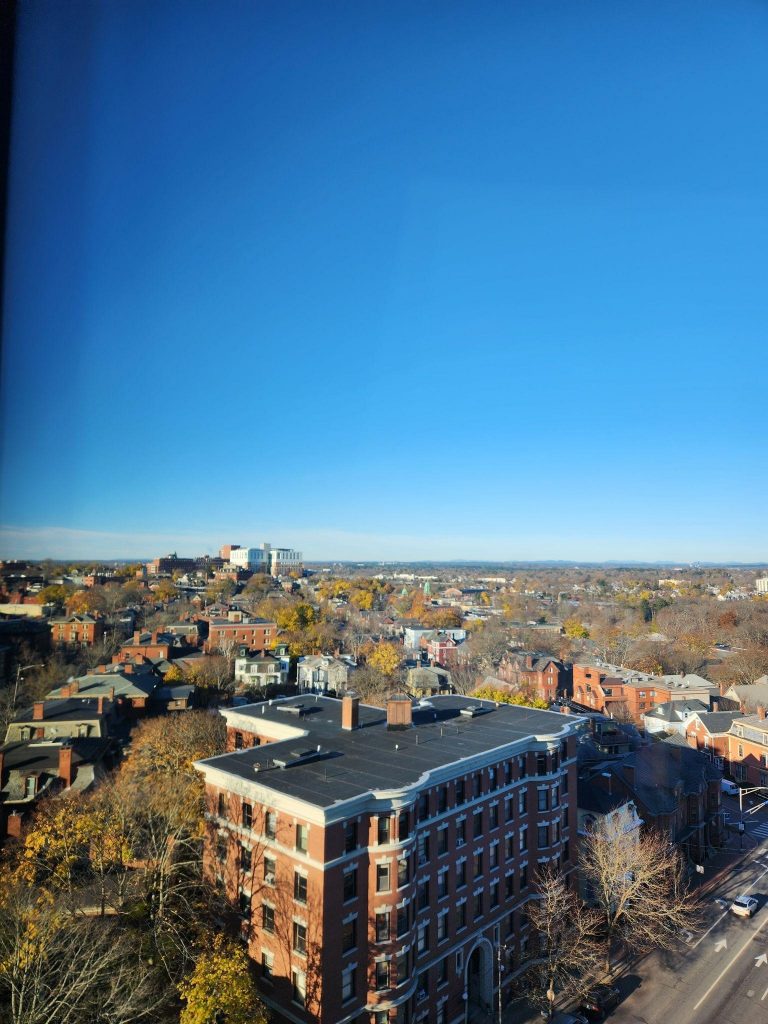Historic New England’s Annual Summit
Posted November 19, 2024 by Aurora Daniel
This past week I attended Historic New England’s annual summit in Portland, Maine. I interned with Historic New England this past spring and during that I found out that they had a scholarship to help current students attend the summit. It covered food, a one-night stay at the hotel where the summit was hosted, parking and travel reimbursement. The worst thing that could happen if I applied was to be rejected so I went for it. Thankfully, I was one of the recipients. As a current dual LIS and History student here at SLIS I’m always looking for opportunities to expand upon what I’m learning in the classroom and it seemed like the summit would provide that. However, what I hadn’t expected was how much fun I would have.

View of Portland from my hotel room
The summit primarily consisted of a series of lectures given on a range of topics from building preservation to how cultural institutions can better address the current socio-political landscape to how climate change is impacting this sector. One of my favorites was “Culture as Prescription,” which was a panel discussion focused on art and culture prescriptions. The leader of the panel, Michael Bobbitt, is the current executive director of the Mass Cultural Council and talked about Massachusetts’ pilot program where patients can receive prescriptions from their providers to engage in community-based arts and cultural institutions as a way of addressing physical and mental health ailments. These prescriptions would charge the insurance companies for 8-12 sessions after which a patient could seek an additional prescription. Although programs similar to these exist in other countries this is the first of its kind in the U.S. The other folks on the panel discussed how a program like this impacts or could impact their work. Listening in made me hopeful that this could take off across the country as there is an increasing demand for connection and socialization and it could also become a key part of funding arts and culture since it’s the insurance companies that are charged, not the individuals receiving the prescriptions.
The other session I loved was “A House Restored.” This was given immediately after lunch on day two. As you might imagine, the crowd was a little sleepy and their attention was waning after being inundated for a day and a half. Lee McColgan, the speaker of the talk, was the perfect antidote to this. Instead of pleading with the audience to purchase his book he sprinted on stage and launched into an anecdote about learning how to do the initial woodwork that he needed in order to restore the kitchen. His fifteen minute talk consisted of jumping from stage to empty front row chairs, imitation axing and sawing, demanding the audience to answer questions about his eccentric yet obvious responses to the roadblocks that appeared in this task, and his near constant worries about losing toes during the process. By the time he exited stage right everyone was alert, amused, and slightly anxious. It was as if we were all in his metaphorical preservation trenches and the relief when the story ended was palpable. Though it did mean the rest of the afternoon felt boring without that level of energy on stage.

Lee McColgan hyping up historic preservation
There were breaks and meal times to network and talk with the speakers. During one of these I bumped into one of my professors from undergrad whom I had taken a historic preservation class with. I ended up getting to chat with her and some of her colleagues about their current research and hear their responses to some of the topics. It was interesting to be both a professional and a student at the summit. It felt as though I was trying to simultaneously network with and be mentored by those I encountered. It was a great first experience in a professional conference-like setting as I didn’t have to be constantly trying to put myself out there. This feels like the first step towards preparing me for post-grad life. I’m incredibly grateful for all of the support Historic New England has given me as I do so.
